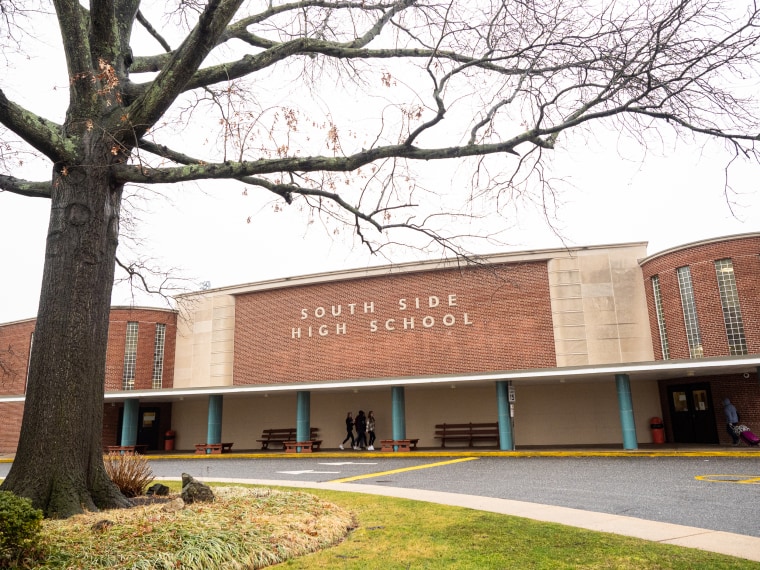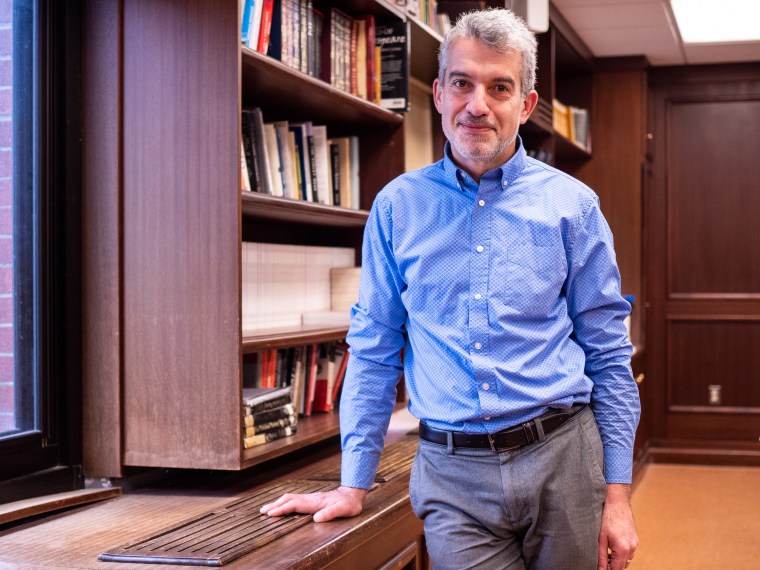When Is An Enrichment-only Management System Plan Incorrect For Servicing Gifted Studentsã¢â‚¬â„¢ Needs?
This article about SEM schools was produced in partnership with The Hechinger Written report, a nonprofit, independent news organisation focused on inequality and innovation in didactics. This is office 2 of the series "Gifted Educational activity's Race Problem."
ROCKVILLE Center, N.Y. — It was vii:58 a.yard., and Bruce Hecker's twelfth grade English form at South Side High School had the focused attention of a college seminar, with piddling chitchat or sluggishness despite the early hour. Students discussed the relevance of Arthur Miller'southward play "The Crucible" to the McCarthy hearings and to current competing fears of terrorism and technological surveillance.
The conversation that morning in December 2019 followed the lead of the seven or viii nearly vocal students. Occasionally, Hecker interrupted to encourage participation from a scattering of students who receive support services to keep up with the class'due south rigorous curriculum.
The students Hecker called on hesitated, cleared their throats and said "um." But when they did speak, their comments were clear and cogent.
"If you lot're a kid and you suspension a vase," ane student reflected on the theme of scapegoating in Miller's play, "you don't become these concepts. But your first thought is notwithstanding to blame the dog." His peers laughed in appreciation.

More than than xxx years ago, Rockville Centre began a gradual but adamant attempt to do away with gifted classes in its unproblematic schools also equally many of the tracked classes at the heart and loftier schools. The goal wasn't to eliminate all tracking, South Side Principal John Murphy said. Upperclassmen can nevertheless choose to take more than challenging math, science and foreign language classes. It was, instead, to avoid creating a caste system past assigning students to remedial, average or advanced classes before they'd had a hazard to develop their bookish potential.
Those assignments often became self-fulfilling prophecies fifty-fifty though they didn't always accurately reflect students' abilities. This can have a long-term affect; the rigor of high school courses has been plant to exist the No. 1 predictor of college success. In Rockville Centre, tracked classes likewise led to racial and economic segregation in a loftier school where a fifth of the nearly ane,100 students are Black or Latino and the balance of the educatee body is most entirely white.
Early on, administrators establish that many Black and Latino students and students from low-income families avoided the most challenging classes even later being given the option to enroll in them. So at present, some of South Side's college-level classes, like Hecker's 12th grade English, are not merely open up to all, but also required.

Around the country, gifted and talented programs accept come under fire for exacerbating school systems' already stark racial and economic segregation. In 2019 in New York City, a group commissioned by Mayor Pecker de Blasio, The Schoolhouse Diversity Advisory Group, recommended doing away with all gifted and talented programs, while that aforementioned twelvemonth Seattle attempted unsuccessfully to eliminate its programs as a way to alleviate school segregation.
Screens used to select students for loftier performing schools and avant-garde classes based on grades and examination scores besides face mounting criticism for exacerbating segregation. Last wintertime, a commune near Philadelphia agreed to reduce its number of tracked classes at the middle and high school levels and increment access to Advanced Placement courses in response to a discrimination lawsuit brought past parents.
Just some educators, parents and students worry well-nigh what might replace screened classes and accelerated programs. Is it possible, they wonder, to teach all students at all levels together in one class? And, if it is, volition teachers receive the back up they need to succeed?
Related: Gifted classes may not help talented students movement ahead faster
Even when school systems practice have a program for how to bring students at different academic levels together while supporting and challenging each student, those plans don't necessarily succeed at undoing long-continuing racial and economic segregation.

In Washington, D.C., new magnet schools based on the University of Connecticut's Schoolwide Enrichment Model, which aims to provide special programming for students at all performance levels, have been met with enthusiasm, simply then far have produced uneven outcomes in terms of improved schoolhouse exam scores, and have had niggling impact on schoolhouse diversity. And while educators at South Side have expert reason to point to their school's academic success, students and parents say that pushing students and then hard to excel takes an emotional toll, and have demanded less rigor. Some take even asked for a return to more tracking.
As school systems around the land work to accost entrenched educational inequities, these experiments provide insights into the benefits and challenges of doing away with tracked classes and gifted programs.
Removing tracked classes in Rockville
It was 1989, and equally a new Spanish teacher in Lawrence, New York, Carol Burris was assigned an eighth form class chosen Linguistic communication for Travelers. Its students weren't fooled past the elegant name. All had taken a foreign language the previous year and failed, and they knew that catastrophe up in Burris' class meant expectations had been lowered. "There was a existent culture that 'We detest schoolhouse and we hate language,'" Burris said. Out of 29 students, 27 were boys. Most were Blackness and Latino kids living in poverty.
The experience stayed with Burris, and when she became Due south Side's principal in 2000, she found agreeing educators worried virtually the harm tracking could cause and who, over the past decade, had started to dismantle information technology.
Rockville's administrators knew that removing academic tracks would be fraught. Then, the district started past replacing divide gifted classes in unproblematic school with individualized, project-based "talent" classes for all students.
Those classes proved popular. In one case parents bought into the idea that in that location didn't accept to exist winners and losers, it was easier to move bookish integration into higher grade levels.

The district too planned how to assistance students with weaker skills manage accelerated classes. Before Rockville Centre detracked math in the ninth and 10th grades, for example, it added support math classes in middle school and so that all students graduated 8th form having completed algebra.
At each stride, the district used outcome data to guide its reforms and convince the community that the efforts were working and, in particular, that the strongest students weren't being shortchanged.
For more of NBC News' in-depth reporting, download the NBC News app
Today, the school requires field of study teachers in each grade to teach the same content at the same time. Such coordination facilitates back up classes that meet every other day during the school day, with one teacher for every half dozen or seven students. Students in these classes are pre-taught material, making them meliorate prepared to sympathize textile in their mainstream classes.
Taking such a systematic approach to shrinking the achievement gap may audio obvious. But around the state, efforts to broaden admission to accelerated classes and, in some districts, to mandate Advanced Placement classes for all students have been implemented without ensuring that students have the background material necessary to succeed.
Related: Up to 3.6 1000000 students should be labeled gifted, just aren't
South Side likewise turned to the International Baccalaureate (IB) diploma, a Swiss-based program that offers a demanding high school degree. (Twoscore-three pct of South Side students earn a full IB diploma, according to the principal.) The model was chosen equally South Side's master honors programme in the mid-1990s not just for its rigor, just besides for its flexibility. Compared to Advanced Placement classes, which require students to master a big and specific torso of factual noesis, the IB plan focuses on depth of analysis.
So, for example, S Side replaced Dickens' "A Tale of Two Cities" with James Joyce's "Dubliners," both of which provide students the opportunity to clarify a complex and canonical work of English literature. Russ Reid, who taught English at South Side for more than forty years, explained: "If you have 'A Tale of 2 Cities' out of the curriculum, there are those that get, 'Oh, my God, you're not teaching Dickens.' But a reluctant learner sees that 450-folio novel and says, 'The hell with it.'"
"It's hard to argue that 'Dubliners' is an easy read," Reid added. Simply each story is relatively short. "If students read 12 stories and blow off the other three, they're not going to be lost. I don't think we're educational activity to the middle when we're talking about 'The Dead.' But we have made it more than manageable."
As bookish integration avant-garde, students' test scores improved — not simply for weaker students, merely also for students already achieving at a high level.
The Schoolwide Enrichment Model comes to D.C.
Nothing was unproblematic about the experiment undertaken at Rockville Centre, but having only ane high schoolhouse with a relatively depression-needs population did go far easier. Just 15 percent of the roughly 1,000 students at the school receive free or reduced dejeuner, a federal marking of poverty.
By contrast, in Washington, D.C., 77 percent of public school students are economically disadvantaged. Many students from higher-income families go to private schools or move to the suburbs to avert attending schools where a large proportion of students perform below grade level.
This trend intensified when, in 2005, D.C. Public Schools closed its gifted and talented programs. And so, in 2012, the district created an office of advanced and enriched teaching to go on more middle-class families in the arrangement and simultaneously serve the learning needs of its high-performing, low-income students. Similar Rockville Centre, the goal was to provide enrichment without exacerbating racial and economic inequity or farther segregating an already segregated school system.
To reach that tricky residual, D.C. turned to the Schoolwide Enrichment Model (SEM), used in more than 4,000 schools nationwide, and internationally. Joseph Renzulli and Sally Reis, professors at the University of Connecticut's Neag School of Pedagogy, created their model to help diversify accelerated classes and gifted programs by encouraging schoolhouse systems to broaden their concept of giftedness and ferret out student potential across what's measured by standardized tests. The method assesses qualities such every bit motivation, marvel, empathy, creativity and self-regulation, and exposes young students to a wide range of enriching experiences to discover what excites them.
Renzulli and Reis are proponents of diversifying gifted programs, non eliminating them. In fact, they believe it's unreasonable to expect one teacher to teach students at all levels effectively together. "A lot of lower-achieving kids feel even worse about themselves when they're forced to be in classrooms where the content is consistently above their level," while the learning needs of higher performing students are regularly ignored, Reis said.
Despite this, Renzulli and Reis practice encourage the use of their model in systems like D.C.'s that don't offer gifted programs because they believe that discovering and deepening students' individual passions — a mainstay of gifted education — is useful for all students.
To accomplish this in mainstream schools, their model calls for flexible small group instruction inside classes — based at times on ability, at times on involvement — too as a focus on project-based learning so students can pursue their passions. They also encourage all SEM schools to have a total-time talent specialist so that the brunt of differentiating education doesn't autumn entirely on the classroom teacher.
Ida B. Wells Middle Schoolhouse, D.C.'south newest SEM school, opened merely last year. Although roughly 2-thirds of its students entered the school performing below grade level in math and three-quarters below class level in English, according to the urban center, the school said it was able to recruit a small group of high-achieving Black and Latino students, including a scattering from private schools and gifted programs in neighboring states. They came for the enrichment, too as for the school'south low teacher-student ratio, made possible by having all classes inclusive of students in special education, a quarter of the school'south population, and English linguistic communication learners. The model means that there'southward funding for every form to have two teachers, and for English and math classes to have iii, with arable opportunity for small grouping didactics.
Related: Twice exceptional, doubly disadvantaged? How schools struggle to serve gifted students with disabilities
In improver, Ida B. Wells' talent specialist Nila Austin provides pullout classes for both struggling and accelerated students, as well as enrichment classes that all students can choose to attend.
A voice communication elective that Austin offers chosen Soap Box is open up to all. In class final December, each student performed a speech on a topic of personal importance. One sixth grader decried colorism, explaining how darker-skinned slaves worked in the fields while lighter-skinned slaves worked indoors, and described "bizarre tests" later used to determine "how Black" a person was, like the pencil test in South Africa, which judged the kinkiness of people's hair.

Students in need of actress academic support as well receive this kind of personally meaningful enrichment. Before Ida B. Wells' sixth grade English language form began reading Mildred Taylor'south "Roll of Thunder, Hear My Cry," Austin assigned her small group of struggling readers Kondwani Fidel'south "Hummingbirds in the Trenches," which explores similar themes of race, class and trauma, but is more accessible in language and setting. They also studied the psychology of trauma, wrote their own trauma narratives and had the opportunity to meet Fidel. When asked if students in her back up class feel stigmatized, Austin said, "Students ask me all the time how they tin can get into that class."
And yet, eight years in, it's not clear how much impact D.C.'south SEM program has had on the kinds of outcomes most commonly used to measure academic success.
Students at about SEM schools in D.C. are more likely to perform below grade level than at or higher up it. A couple of SEM schools have seen striking improvement in their standardized test scores in merely a few years, fifty-fifty though most students haven't reached grade level, only other SEM schools have seen minimal or no improvement. (Ida B. Wells is too new to provide such data.)
The model has also failed to create greater racial or economic diverseness in D.C.'southward schools. At more half of D.C.'s 11 SEM schools, nearly all of the students are economically disadvantaged.
Ida B. Wells' Principal Megan Vroman acknowledges that there are benefits to racial and economic integration, just she said she also sees advantages when students attend schools like hers that aren't integrated and instead "reaffirm their identity."
Just the schools' overall low bookish performance concerns some in the field. "All pedagogy should be enriching. But in some cases, all students getting enrichment may mean that no students are really getting opportunities to take on more advanced piece of work," said Adam Tyner, associate manager of enquiry at the Thomas B. Fordham Found, who co-authored a report on ways to increment the representation of Blackness and Latino students in gifted programs.
Renzulli and Reis themselves have noted that teachers don't always implement SEM in ways that serve the learning needs of their highest-performing students. Much of the research washed on SEM, which has been in schools for decades, has shown positive results, including increased math and literacy skills, increased creative output from students and even long-term impact on college and career choices. But Renzulli and Reis conducted many of the studies, while others were written by administrators who'd had success with the program.
Still, Renzulli and Reis are impatient with the idea that all progress tin can be measured in a few years past standardized tests. "Artistic productivity, which is the ultimate goal of the model, isn't always something you can measure in accomplishment scores 1 or two years in. Students commencement have to develop interests. They have to develop habits of mind over time," Reis said.
Matthew Reif, director of extended learning and bookish recovery for D.C. Public Schools, believes SEM has helped D.C. create a more engaging and challenging learning experience, even if that's not notwithstanding captured in test scores. The most important SEM outcome to engagement, he said, is an ever-growing number of D.C. educators who desire to bring SEM to their schools.
'It'southward better for struggling students to exist in my classroom'
The results in Rockville Centre are more concrete. In 2019, 98 pct of South Side students graduated with a New York Country Regents diploma, while 89 percent of all students and 67 percent of economically disadvantaged students earned a New York State Regents with Advanced Designation. Statewide, a tertiary of the students received an advanced designation diploma.
Only ten students interviewed in a group last year at South Side Loftier School also said that the school is a competitive force per unit area cooker and that they feel pushed to take advanced classes. A white student whose parents both take advanced degrees said she feels stressed, equally did a Black student who is on runway to be ane of the first in his family to attend higher.
When the experiment at Rockville Center started in the late 1980s, Principal Potato said, it was families of the highest-performing students who were skeptical. Today, resistance comes from parents who believe the bookish pressure is not skillful for their children. In 2018, parents demanded that the school lower its graduation requirements. In response, though every student must notwithstanding accept the IB English and history classes in 11th and twelfth grades, this year the schoolhouse removed the requirement that they sit for the IB exams. Students can also exempt themselves from some of the longer writing assignments that the IB requires.
Hecker, the English language teacher, said he sees that requiring loftier-level classes does have its costs. Only he believes the cost of segregating students based on academic operation is far greater. "I think it's better for struggling students to be in my classroom and not in some other room wondering what's going on in those classes where the real learning is happening," he said. "I think that is completely demoralizing."
Sign up for The Hechinger Report's newsletter.
When Is An Enrichment-only Management System Plan Incorrect For Servicing Gifted Studentsã¢â‚¬â„¢ Needs?,
Source: https://www.nbcnews.com/news/education/gifted-programs-worsen-inequality-here-s-what-happens-when-schools-n1243147
Posted by: orvisbrimee.blogspot.com


0 Response to "When Is An Enrichment-only Management System Plan Incorrect For Servicing Gifted Studentsã¢â‚¬â„¢ Needs?"
Post a Comment